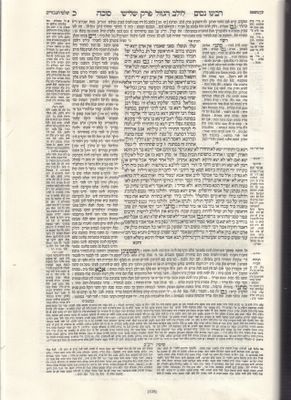
HIDE/SHOW IMAGE
20a
{Succah 41b continues}
because they said that a man does not fulfill his obligation on the first day of Yom Tov of Succot with the lulav of his fellow. And on the rest of the days of Succot, one fulfills his obligation with the lulav of his fellow.
Gemara:
From where do we know these words?
For the Sages learnt {in a brayta}:
{Vayikra 23:40}:
And there was an incident with Rabban Gamliel, Rabbi Yehoshua, Rabbi Eleazar ben Azarya, and Rabbi Akiva that they were coming on a boat and only Rabbab Gamliel had a lulav, because he acquired it for 1000 zuz. Rabban Gamliel took it and fulfilled with it. He gave it to Rabbi Yehoshua as a present. He took it and fulfilled with it. He {Rabbi Yehoshua in turn} gave it to Rabbi Eleazar ben Azarya as a present. Rabbi Eleazar ben Azarya took it and fulfilled with it. He gave it to Rabbi Akiva as a present. Rabbi Akiva took it and fulfilled with it, and returned it to Rabban Gamliel.
Why does it tell me that he returned it to Rabban Gamliel? In order to inform us along the way that a present on condition that it be returned to him is called a present, and like Rava.
For Rava said in perek yesh nochalin {Bava Batra 137b}:
Take this etrog as a present on condition that you return it to me. He took it and fulfilled with it. If he subsequently returned it to him, he fulfilled; if he did not return it to him, he did not fulfill.
And we learn also there: Rava {our gemara: Rabba} bar Rav Huna said: The brothers who acquired an etrog with tefisat habayit {descendant's estate, in which they have benefits to the property but are not its owners}, if one of them takes it and fulfills with it -- if he is able to eat it, he fufills, but if not, he does not fulfill. And this is only if there is an etrog to each one {of the brothers}, but if there is {to match the one etrog} a quince or a pomegranate, he does not fulfill.
And we derive from this that if two purchase a lulav in partnership, neither one can fulfill his obligation on the first day {of Succot} until one gives his portion to his fellow, and if not he does not fulfill.
Mar bar Amemar said to Rav Ashi: Father would pray with it.
And we asked on this from this that we learnt {in a brayta}: A man should not hold tefillin in his hand, a sefer Torah in his arm, and pray. And we answer: There it is not a mitzvah and so he is distracted. Here it is a mitzvah and so he is not distracted.
They learnt {in a brayta}: Rabbi Eleazar beRabbi Tzadok said: This was the custom of the men of Yerushalayim: A man would leave his house, and his lulav was in his hand. He would enter the synagogue, and his lulav was in his hand. He would read Shema and pray, and his lulav was in his hand. He would read from the Torah or would lift his hands {for birkat kohanim} and he would place it on the floor. To visit the sick and to comfort mourners, and his lulav was in his hand. He entered the study hall, he would entrust it in the hand of his servant, in the hand of his son, or in the hand of his agent.
Mishna:
Rabbi Yossi says: The first day of Yom Tov of Succot which fell out on Shabbat, if he forgot and carried the lulav to the public domain, he is exempt, for he brought it out with permission.
{Succah 42b}
Gemara:
Abaye said: They only learned this in the case when he did not yet fulfill, but if he had already fulfilled, he is liable.
When he had not yet fulfilled, why is he exempt? When he lifted it up, did he not fufill?
Abaye said: Where he reversed it {so as not to fulfill}. For Chizkiya cited Rabbi Yirmiya in the name of Rabbi Shimon ben Yochai: All the commandments, one does not fulfill them except in the way they grew, for it is stated {Shemot 26:15}:
| טו וְעָשִׂיתָ אֶת-הַקְּרָשִׁים, לַמִּשְׁכָּן, עֲצֵי שִׁטִּים, עֹמְדִים. | 15 And thou shalt make the boards for the tabernacle of acacia-wood, standing up. |
Rava said: Even if you say that he did not turn it over.



No comments:
Post a Comment